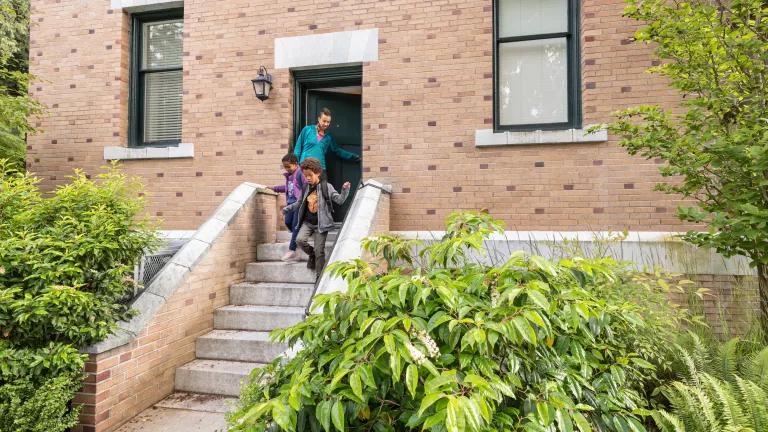Coalition Calls for Equitable, Healthy Buildings in Denver
The Denver City Council’s Safety, Housing, Education & Homelessness committee is considering a policy to increase the efficiency of large buildings by 30%, provide economic and technical support for switching to 100% clean electric appliances, and set the city’s building stock on a trajectory to meet its 2040 climate goals by eliminating nearly 12 million metric tons of carbon over the next two decades.

Updated: The Denver City Council unanimously approved the Energize Denver policy recommendations on November 22, 2021. The new ordinance puts the city on solid track to meet its buildings-related climate commitments by 2040, and to do so by centering economic and racial justice.
The Denver City Council’s Safety, Housing, Education & Homelessness committee is considering a policy to increase the efficiency of large buildings by 30%, provide economic and technical support for switching to 100% clean electric appliances, and set the city’s building stock on a trajectory to meet its 2040 climate goals by eliminating nearly 12 million metric tons of carbon over the next two decades. The policy is the consensus recommendation of a large and diverse group of stakeholders that collaborated for more than half a year on a bold response to the urgency of the climate crisis that also aligns with Denver’s economic growth and equity imperatives.
The Energize Denver Task Force convened affordable housing providers and advocates, labor leaders, building owners and property managers, the conservation community, and the utility industry in a public process committed to racial equity. Equity is an important priority as housing is one area where people, and particularly people of color, are most impacted by inequities in our society. After eight months of hard work and collaboration, the group came to consensus on a policy that:
- Sets increasing energy efficiency targets for large buildings to reduce energy waste and ensure that utility bills remain low for owners and tenants
- Provides economic and technical assistance to make it easier and more affordable to switch from burning gas indoors for heat and hot water to using healthy equipment that can run on 100% clean electricity
- Phases in requirements for fossil fuel furnaces and water heaters that break or come to their end of life to be replaced with clean electric alternatives such as heat pumps, as these modern technologies make more and more economic sense
The Safety, Housing, Education & Homelessness committee is now reviewing the Task Force’s policy proposal. The committee must vote on the policy for it to go for final approval by the full City Council.
Energy Efficiency
For decades, we’ve known that airtight walls and windows, weatherized homes, and efficient appliances help control energy costs for everyone and are the cheapest emission reductions in the built environment. The Task Force policy puts Denver’s buildings on the trajectory to realizing this promise.
Under the proposed policy, the City would set efficiency targets that each larger building type must meet by 2030 and milestones that each building must meet by 2024 and 2027 to ensure all stay on track to meet the ultimate goal of 30 percent reductions in energy use intensity by 2030. Alternative compliance mechanisms and flexibility are built into the policy so that every building—regardless of what it is used for and the socioeconomic circumstances of its occupants—has the resources, time, and technical assistance needed to succeed.
Transitioning to Clean Electricity for All Building Appliances
Even as we clean up our electric grid with increasingly renewable power, carbon emissions and air pollution remain from burning fossil fuels directly in buildings. We burn those fuels—methane gas, propane, and fuel oil—largely to heat spaces in winter and to heat water year-round. Fortunately, highly efficient electric alternatives are available to replace the majority of the fossil-fueled systems in use today.
Earlier this year, an analysis by the City of Denver concluded that between half and two-thirds of the city’s buildings can already replace their space and water heating equipment with electric systems at minimal additional equipment costs. The Task Force’s policy establishes financial and technical assistance to help building owners install these healthier, cleaner electric systems as their old fossil fuel equipment breaks and needs to be replaced.
As more and more building owners gain experience with electric systems, the cost of producing and installing the equipment will continue to fall, and a higher percentage of buildings will be able to cost-effectively install the most climate-friendly technology.
The proposed policy then phases in requirements for all-electric technologies as they become increasingly affordable, starting with incentives, progressing through permitting and planning processes, and eventually requiring fossil fuel systems that burn out be replaced with clean electric alternatives when those systems make financial sense for Denverites.
Racial and Economic Equity Safeguards
The Task Force’s commitment to equity in its process, policy recommendations, and the City’s implementation of the final policy resulted in several important affordability and racial justice safeguards.
The proposed policy includes using a social equity index to identify vulnerable neighborhoods and buildings that will need additional technical assistance, protections, and more sustained economic support during the transition. Social equity indicators that should be included in the equity index include eviction rates, racial composition, health insurance stress, lack of amenities like grocery stores and park space, and rates of asthma.
The social equity index will identify vulnerable neighborhoods where City staff needs to do outreach to all buildings to ensure they are aware of new resources and requirements. These buildings will also be eligible for expedited applications for additional financial and technical support to help ensure that resources can quickly go to those who need them most. Other buildings will also be able to apply for these resources through a more thorough vetting process.
We must eliminate carbon emissions from our homes and buildings in order to tackle the climate crisis. The Energize Denver Task Force policy is thorough, equitable, and ambitious—exactly the kind of action that is needed in this pivotal time.



